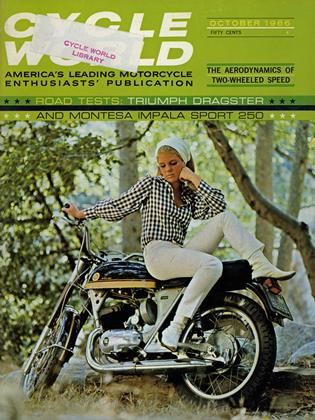CASTLE ROCK TT NATIONAL
ROXY ROXWOOD
THE WEST COAST states of Washington, Oregon and California have been known in recent years to be the area for TT champions and outstanding racing in this category.
Each year Castle Rock, Washington, and Ascot Park in California host national TT events, but the Castle Rock track has the edge in that all the Californians enter and travel to Washington for the 30-lap event, yet few from the northwest will venture south to Ascot the following week for the yearly national in southern California.
'Sixty-six experts and 60 amateurs gathered at the small southern Washington town this year for time trials the night before. All of the nation’s well known riders made it through the trials this year to the heat races that open the Saturday night show.
More than 9,000 fans poured into Castle Rock for the second annual event that is sponsored by the Mt. St. Helens Motorcycle Club and sanctioned by the AMA. Under the direction of referee Dave Welch, things ran smooth as silk from the time the first rider entered the track on Friday, until the final checkered flag on Saturday night.
The actual running of the 30-lap national final with the 16 fastest experts was actually sub-standard compared to the heat races. For pure racing the amateur final out-shown the expert feature. The heats, some of the most evenly matched in national history, were heartbreakers for many of the nation’s top TT riders. Only four riders that rode in the national final a year ago made their way out of the heats this year! Such names as Dave Palmer, George Roeder, Bart Markel, Jack Simmons, Dick Dorresteyn, Cal Rayborn, Roger Reiman and Mert Lawwill never saw the final starting line.
To add to the grief of such an illustrious list of losers, Daytona winner Buddy Elmore, last man to make the program, fell in the final practice before the heat races and tweaked the same shoulder he broke last May at a Carlsbad road race.
The only repeaters in the final this year were: Eddie Mulder, Skip Van Leeuwen, Sonny Burres and Francis Franklin.
Mulder was brilliant in the 30-lap final over the tight sweeping track that is about one-third mile in length. There is no jump of any type, but a rider finds himself rubbing wheels and handlebars more often than not. Mulder was off like a shot into the lead. Skip Van Leeuwen and Dan Haaby fought it out for second with Burres right behind.
It was a bad night for any rider carrying the number 22. Haaby, the national holder of this digit, broke a chain and fell in front of Burres, who went sailing over the top of the BSA rider and nearly into the crash wall.
(Continued on page 99)
Next lap, Gene Romero (22Z) came up with bugs in the engine and was out of the running. The following lap, Bruce Holland (22R), the fourth fastest qualifier, fell and knocked himself out of contention, although he did remount and reenter the race.
Burres lost two positions missing Haaby which put Mulder further out in front. The Portland rider soon regained lost ground and moved up to pass Van Leeuwen on the twelfth round and move into a distant second.
For Mulder it was his second straight national TT win. His time was 13:24:46. He closed out last season winning the Peoria, 111., national in a blaze of glory and a final lap duel with Markel.
Californians also showed their rear wheels to the best in the northwest in the amateur class when Southern California’s Jim Berry and Rich Thorwaldson teamed up to run one-two in the 15 lap amateur final.
Dave McCleod, the nation’s top novice in the AMA standings last year with more than 50 victories, could pull no better than a distant third, but did win his heat race with a faster time than those posted by Berry and Thorwaldson.
The actual racing program was stepped up this year as the threat of rain came early in the afternoon. It poured right after time trials the night before the scheduled event.
Veteran viewers stated after the race that the professional manner in which the race was run off by the Mt. St. Helens club is one of the best arguments for still allowing clubs to promote money-paying events. They did a job that would rival any show put on by a professional promoter at any track. ■









